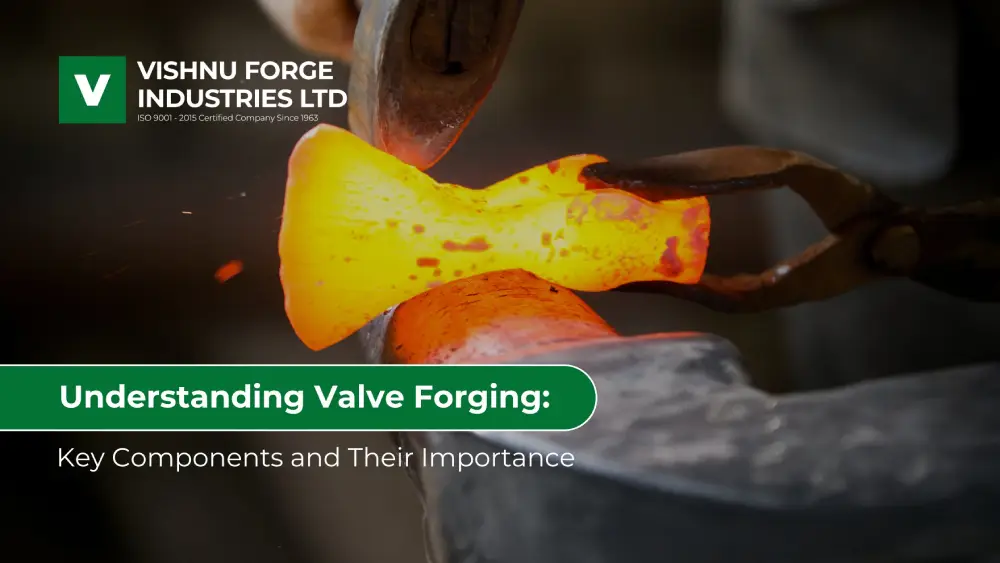Introduction to Valve Forging
Valve forging plays a pivotal role in industrial systems, especially in applications requiring high strength and reliability. Unlike valves created through casting, forged valves are crafted by compressing metal, which enhances their density and structural integrity. Industries rely on these robust components to manage, control, and regulate the flow of liquids and gases across complex systems. In high-stress environments, from oil and gas valves to chemical processing plants, the reliability of forged valves becomes paramount, ensuring the safety and efficiency of operations.
What Is Valve Forging?
Definition and Process of Forging in Valve Production
Forging is a manufacturing technique involving the deformation of metal under high pressure, which aligns the metal’s grain structure to achieve superior strength. In valve forging, this process creates components that withstand intense pressures and temperatures, ideal for industrial use. Unlike casting, which pours molten metal into a mold, forging compresses metal, making it denser and more durable.
Differences Between Forged and Cast Valves
While both forged and cast valves serve essential purposes, forged valves excel in high-pressure and high-temperature applications due to their durability. With fewer voids and inclusions than cast valves, high-quality forged valves meet stringent safety standards, providing enhanced performance and longevity.
Key Benefits of Forged Valves
Enhanced Strength and Durability
One of the primary advantages of forged valves is their strength. The valve forging process creates a component with exceptional durability, allowing it to perform reliably even in extreme conditions, reducing the need for frequent replacements and lowering maintenance costs.
Improved Resistance to High Pressure and Temperature
Forged valves are engineered to withstand elevated pressures and temperatures. This resilience is crucial for applications in industries like oil and gas, where industrial valves must endure extreme operating conditions without compromising performance.
Primary Components of Forged Valves
Body and Bonnet: The Structural Foundation
The body and bonnet form the core structure of a forged valve, providing the housing that contains all other components. The body, being the primary pressure boundary, must be robust enough to prevent leaks or failure, while the bonnet acts as a cover, protecting the internal parts and ensuring longevity.
Valve Stem and Disc: Ensuring Precision in Flow Control
The valve stem and disc are integral in controlling fluid flow. In forged valve components, these parts are designed for precision, enabling accurate flow control in systems where consistency and reliability are paramount.
Seats and Gaskets: Key Sealing Elements
Seats and gaskets are critical for achieving a leak-proof seal. In corrosion-resistant valves, these elements are crafted to maintain efficiency and safety, crucial for preventing leaks in demanding applications.
Types of Forged Valves and Their Applications
Gate Valves: Ideal for Isolation
Gate valves are used for on-off control, providing full flow or complete closure without throttling. Their robust nature makes them suitable for forged valve applications in high-pressure systems, such as in water treatment and waste management.
Globe Valves: For Precise Flow Regulation
Globe valves are ideal for applications that require precise flow control, crucial in industries like chemical processing where specific flow rates must be maintained.
Ball and Butterfly Valves: Quick Shut-Off Solutions
Ball and butterfly valves are efficient, providing rapid adjustments and minimal fluid resistance, often used in oil and gas valves for quick shut-off capabilities.
Material Choices in Valve Forging
Carbon Steel and Stainless Steel: Common Choices
The choice of materials significantly affects forged valve components. Carbon steel offers durability and cost-effectiveness, while stainless steel provides corrosion resistance, essential for harsh environments.
Alloy Steel for High-Temperature Applications
For high-temperature environments, alloy steel is commonly used. This material performs well under prolonged heat exposure, often selected for industrial valves in power generation.
Corrosion-Resistant Materials for Specialized Environments
Specialized materials, like Inconel and Hastelloy, are used for corrosion-resistant valves in aggressive environments, such as chemical processing plants.
The Role of Forging in Valve Performance
Increased Load-Bearing Capacity
Forging increases the load-bearing capacity of valves, allowing them to endure high pressure without deforming. This quality is essential in forged valve applications where strength is critical.
Enhanced Wear Resistance in Demanding Applications
High-quality forged valves are crafted to resist wear, making them suitable for continuous use in applications where uninterrupted performance is necessary.
Applications of Forged Valves Across Industries
Oil and Gas: Handling Extreme Conditions
In the oil and gas industry, forged valves are essential due to the high pressures and demanding conditions. These valves maintain integrity under stress, ensuring safety in pipelines, refineries, and offshore rigs.
Chemical Processing and Power Generation
Forged valves are widely used in chemical processing and power generation. In chemical plants, corrosion-resistant valves prevent leaks, while in power plants, they handle high-pressure steam reliably.
Water Treatment and Marine Applications
Water treatment facilities and marine environments benefit from industrial valves made through forging. These valves provide reliable control and corrosion resistance, crucial for prolonged exposure to water and chemicals.
Challenges in Forging High-Quality Valves
Precision Requirements and Quality Control
Producing high-quality forged valves requires strict precision and quality control. Any imperfections compromise performance, making it crucial to adhere to stringent production standards.
Balancing Cost with Durability
While valve forging offers significant benefits, it can be costly. Finding a balance between cost and durability is essential, especially for industries with budget constraints.
Conclusion: The Lasting Value of Forged Valves in Modern Industry
Forged valves stand as essential components in modern industrial systems, offering enhanced strength, durability, and reliability across applications. From high-pressure pipelines to precision-controlled chemical processes, the importance of industrial valves crafted through forging is clear. As the demand for sustainable solutions grows, valve forging will continue to meet the evolving needs of industries worldwide.



